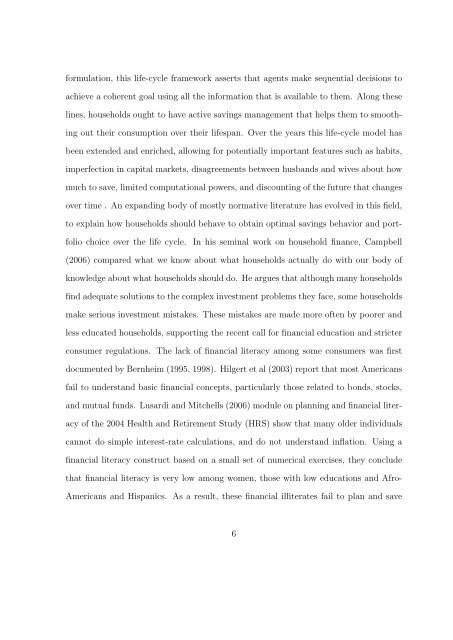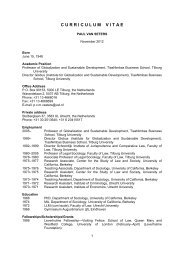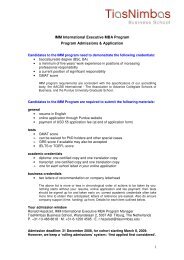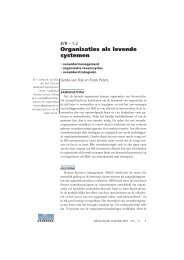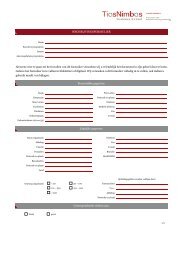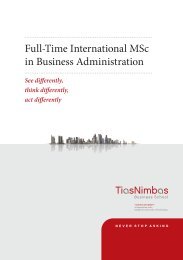Financial Responsibility, Personality Traits and Financial Decision ...
Financial Responsibility, Personality Traits and Financial Decision ...
Financial Responsibility, Personality Traits and Financial Decision ...
Create successful ePaper yourself
Turn your PDF publications into a flip-book with our unique Google optimized e-Paper software.
formulation, this life-cycle framework asserts that agents make sequential decisions to<br />
achieve a coherent goal using all the information that is available to them. Along these<br />
lines, households ought to have active savings management that helps them to smooth-<br />
ing out their consumption over their lifespan. Over the years this life-cycle model has<br />
been extended <strong>and</strong> enriched, allowing for potentially important features such as habits,<br />
imperfection in capital markets, disagreements between husb<strong>and</strong>s <strong>and</strong> wives about how<br />
much to save, limited computational powers, <strong>and</strong> discounting of the future that changes<br />
over time . An exp<strong>and</strong>ing body of mostly normative literature has evolved in this field,<br />
to explain how households should behave to obtain optimal savings behavior <strong>and</strong> port-<br />
folio choice over the life cycle. In his seminal work on household finance, Campbell<br />
(2006) compared what we know about what households actually do with our body of<br />
knowledge about what households should do. He argues that although many households<br />
find adequate solutions to the complex investment problems they face, some households<br />
make serious investment mistakes. These mistakes are made more often by poorer <strong>and</strong><br />
less educated households, supporting the recent call for financial education <strong>and</strong> stricter<br />
consumer regulations. The lack of financial literacy among some consumers was first<br />
documented by Bernheim (1995, 1998). Hilgert et al (2003) report that most Americans<br />
fail to underst<strong>and</strong> basic financial concepts, particularly those related to bonds, stocks,<br />
<strong>and</strong> mutual funds. Lusardi <strong>and</strong> Mitchells (2006) module on planning <strong>and</strong> financial liter-<br />
acy of the 2004 Health <strong>and</strong> Retirement Study (HRS) show that many older individuals<br />
cannot do simple interest-rate calculations, <strong>and</strong> do not underst<strong>and</strong> inflation. Using a<br />
financial literacy construct based on a small set of numerical exercises, they conclude<br />
that financial literacy is very low among women, those with low educations <strong>and</strong> Afro-<br />
Americans <strong>and</strong> Hispanics. As a result, these financial illiterates fail to plan <strong>and</strong> save<br />
6


